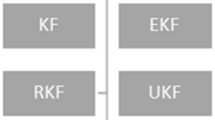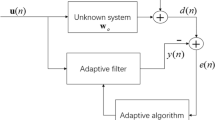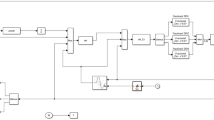Abstract
This paper addresses the state estimation problem of linear discrete-time time-varying stochastic systems with unknown inputs (UIs). It is shown that the globally optimal unbiased minimum-variance filters may not satisfy the minimum-variance property, and hence they cannot eliminate noises appropriately. If this is the case, the well-known Kalman filter may give a better solution, which however may also not be the best one due to that the imbedded unknown input model may not be practical. To remedy the filtering degradation problem, a robust filter named as the KFLMS, which has good noise rejection property for such systems, is developed in this paper, where the UI estimates are obtained by using least mean square algorithm and the state estimation is achieved via the previous proposed two-stage Kalman filtering approach. Numerical examples are provided to show the effectiveness of the proposed results. Specifically, simulation results illustrate the goodness of the new method in the sense of lower root mean square error and better noise rejection property.






Similar content being viewed by others
References
J. Chen, R.J. Patton, Optimal filtering and robust fault diagnosis of stochastic systems with unknown disturbances. IEE Proc. Control Theory Appl. 143(1), 31–36 (1996)
J. Chen, Y. Liu, X. Wang, Recursive least squares algorithm for nonlinear dual-rate systems using missing-output estimation model. Circuits Syst. Signal Process. 36(4), 1406–1425 (2017)
J. Chen, J. Ma, Y. Liu, F. Ding, Identification methods for time-delay systems based on the redundant rules. Signal Process. 137, 192–198 (2017)
Y. Cheng, H. Ye, Y. Wang, D. Zhou, Unbiased minimum-variance state estimation for linear systems with unknown input. Automatica 45(2), 485–491 (2009)
M. Darouach, M. Zasadzinski, Unbiased minimum variance estimation for systems with unknown exogenous inputs. Automatica 33(4), 717–719 (1997)
T. Floquet, J.-P. Barbot, State and unknown input estimation for linear discrete-time systems. Automatica 42(11), 1883–1889 (2006)
S. Gillijns, B. De Moor, Unbiased minimum-variance input and state estimation for linear discrete-time systems. Automatica 43(1), 111–116 (2007)
S. Gillijns, B. De Moor, Unbiased minimum-variance input and state estimation for linear discrete-time systems with direct feedthrough. Automatica 43(5), 934–937 (2007)
M.S. Grewal, Kalman filtering, in International Encyclopedia of Statistical Science (Springer, Berlin, 2011), pp. 705–708
S. Haykin, B. Widrow, Least-Mean-square Adaptive Filters, vol. 31 (Wiley, New York, 2003)
M. Hou, R.J. Patton, Optimal filtering for systems with unknown inputs. IEEE Trans. Autom. Control 43(3), 445–449 (1998)
C.-S. Hsieh, Robust two-stage Kalman filters for systems with unknown inputs. IEEE Trans. Autom. Control 45(12), 2374–2378 (2000)
C.-S. Hsieh, Optimal minimum-variance filtering for systems with unknown inputs, in The Sixth World Congress on Intelligent Control and Automation, 2006 (WCICA 2006), volume 1 (IEEE, 2006), pp. 1870–1874
C.-S. Hsieh, On the global optimality of unbiased minimum-variance state estimation for systems with unknown inputs. Automatica 46(4), 708–715 (2010)
C.-S. Hsieh, On the optimality of two-stage Kalman filtering for systems with unknown inputs. Asian J. Control 12(4), 510–523 (2010)
C.-S. Hsieh, F.-C. Chen, Optimal solution of the two-stage Kalman estimator. IEEE Trans. Autom. Control 44(1), 194–199 (1999)
C.-S. Hsieh, M.A. Majidi, Implementation issues of unbiased minimum-variance state estimation for systems with unknown inputs, in 2014 CACS International Automatic Control Conference (CACS) (IEEE, 2014), pp. 323–328
K.P. Kitanidis, Unbiased minimum-variance linear state estimation. Automatica 23(6), 775–778 (1987)
H.A. Sayed, T. Kailath, A state-space approach to adaptive RLS filtering. IEEE Signal Process. Mag. 11(3), 18–60 (1994)
S. Sundaram, C.N. Hadjicostis, Delayed observers for linear systems with unknown inputs. IEEE Trans. Autom. Control 52(2), 334–339 (2007)
D. Wang, Y. Gao, Recursive maximum likelihood identification method for a multivariable controlled autoregressive moving average system. IMA J. Math. Control Inf. 33(4), 1015–1031 (2015)
Author information
Authors and Affiliations
Corresponding author
Rights and permissions
About this article
Cite this article
Majidi, M.A., Hsieh, CS. & Yazdi, H.S. Kalman Filter Reinforced by Least Mean Square for Systems with Unknown Inputs. Circuits Syst Signal Process 37, 4955–4972 (2018). https://doi.org/10.1007/s00034-018-0792-x
Received:
Revised:
Accepted:
Published:
Issue Date:
DOI: https://doi.org/10.1007/s00034-018-0792-x




